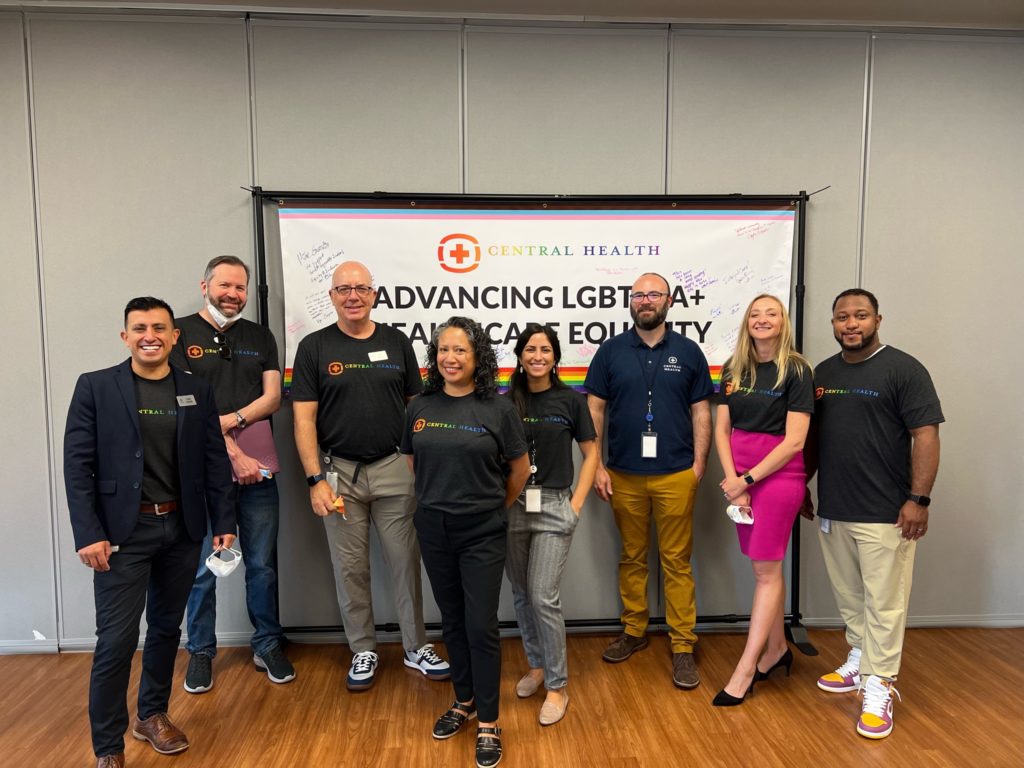
CENTRAL HEALTH CONVENES TRAVIS COUNTY HEALTHCARE PROVIDERS TO IMPROVE CARE FOR LGBTQIA+ PATIENTS
August 10, 2022
(Austin) — Central Health Equity Policy (CHEP) Council announced Wednesday it is convening several Travis County health organizations to embrace the tenets of the Human Rights Campaign’s (HRC) Healthcare Equality Index (HEI), a national benchmarking tool for healthcare organizations to evaluate their level of care for the LGBTQIA+ community.
A news conference introducing this initiative is scheduled from 11 a.m.–noon Tuesday, Aug. 16 at the Central Health Southeast Health & Wellness Center, located at 2901 Montopolis Drive.
HRC developed the HEI to ensure lesbian, gay, bisexual, transgender and queer patients receive equitable, knowledgeable, sensitive, and welcoming healthcare, free from discrimination. The HEI rates more than 2,200 healthcare facilities nationwide.
The Central Health Equity Policy (CHEP) Council chose the HEI initiative as its priority policy initiative in 2020, which was put on hold until this year because of COVID-19. The CHEP includes volunteers representing more than 70 community partners who are experts in policy, data, and community, and who are passionate about health issues affecting Travis County.
“The healthcare needs of LGBTQIA+ patients with low income here in Travis County aren’t always being met,” said Mike Geeslin, President & CEO of Central Health. “By joining the Healthcare Equality Index, local healthcare providers will close gaps and help make certain all of their patients are treated with fairness, compassion and respect.”
CommUnityCare Health Centers, the largest Federally Qualified Health Center (FQHC) in Central Texas, announced they’re seeking the designations. Integral Care will also be incorporating the HEI principles into patient care. People’s Community Clinic has already earned an HEI designation.
“The Health Equality Index is a coveted tool for LGTBQ+ patients to gauge the equity and inclusion of their health care provider,” said Jaeson Fournier, CEO of CommUnityCare Health Centers. “We have long believed in providing high-quality, non-judgmental care — no matter a patient’s race, ethnicity, gender identity, sexual orientation, or income. We look forward to making our policies, for patients and staff, even more welcoming to all, across our nearly 30 health centers in Austin and Central Texas.”
According to the HEI 2022 report, LGBTQIA+ patients face significant challenges in healthcare: 56% of lesbian, gay, and bisexual people surveyed report experiences of serious discrimination in healthcare, while 70% of transgender people surveyed report serious discrimination.
According to QWELL, Greater Austin’s LGBTQIA+ Community Foundation data reveals:
- 47% of LGBQTIA+ patients have had a healthcare employee make cisgender and/or heterosexual assumptions about them (e.g., assuming who they would be interested in sexually/romantically, assuming body parts they may have).
- 30% have been misgendered at a healthcare appointment.
- 55% have had a negative healthcare experience related to their LGBTQIA+ identities.
“I am a member of the LGBTQIA+ community, and also have been a proud CHEP Council member since 2016,” said Brandon Wollerson. “This HEI initiative will allow us to collectively elevate and address the needs of our LGBTQIA+ community members through this proven HEI framework.”
Some Travis County LGBTQIA+ patients have shared their experiences anonymously with QWELL.
“When I told the dentist that I was HIV-positive, he said ‘Oh, you had AIDS,’” one patient said. “I told him ‘I don’t have AIDS, I’m HIV-positive and undetectable.’ He came back with, ‘It’s the same thing. You have AIDS.’ So, I got up, left, and have not been back.”
“Especially with the new administrative orders federally (regarding doctors being able to refuse care to transgender patients) but even before then, I have not felt safe coming out to the majority of my healthcare providers for safety reasons,” added another patient.
The HEI enables healthcare organizations to assess their own policies and practices vis-à-vis these requirements and recommendations and equips them with the training and resources they need to remedy gaps. It also enables organizations to receive public recognition for their commitment to equity and inclusion.
There are four criteria to earn the HEI designation:
- The Non-Discrimination and Staff Training criteria represents policies and practices that are considered foundational to LGBTQIA+ patient-centered care;
- The LGBTQIA+ Patient Services section is designed to familiarize an organization with the best practices from The Joint Commission and other sources to enhance care to LGBTQIA+ patients;
- Employee Benefits and Policies criteria focuses on the employee as much as the patient in providing inclusive care; and,
- The Patient & Community Engagement criteria focuses on community outreach and promotion to let the LGBTQIA+ community know you are a welcoming and affirming facility, working toward LGBTQIA+ inclusion.
